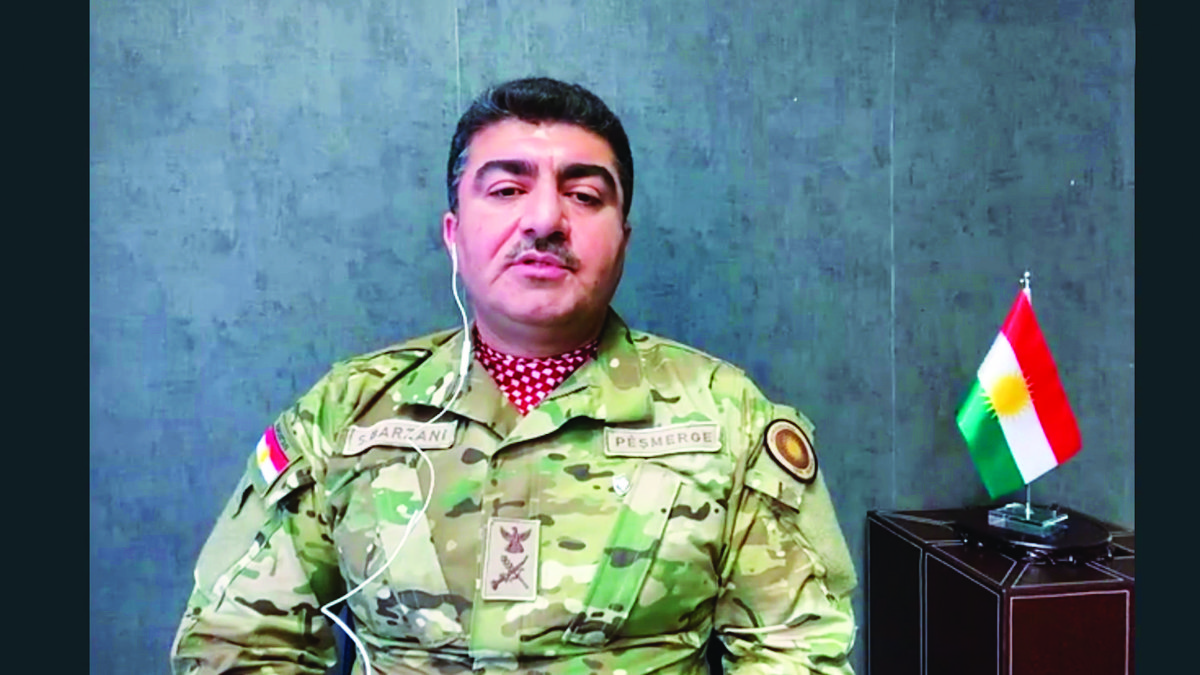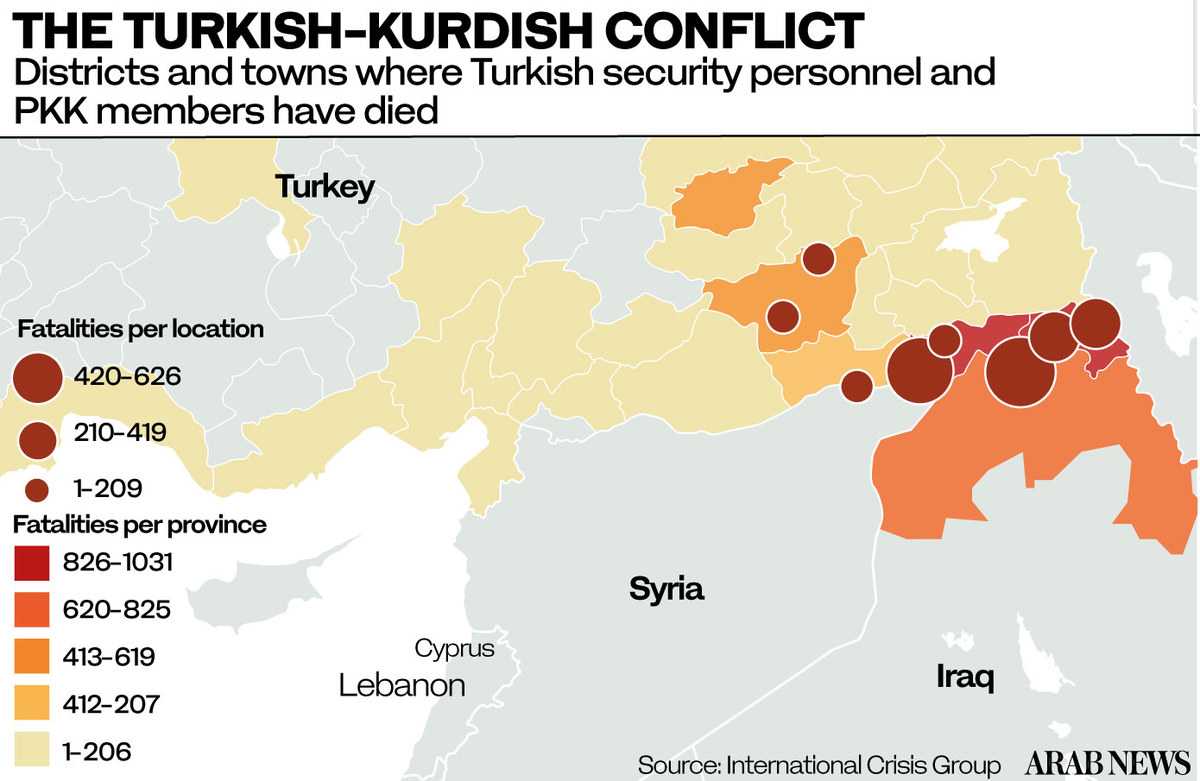DUBAI: The US and other Western coalition members should increase their ground forces in Iraqi Kurdistan in order to head off the threat of a resurgent terror campaign in the region, one of the main fighters against Daesh and Iran-backed militias told Arab News.
General Sirwan Barzani, who commands a key unit of the Kurdish Peshmerga armed forces in northern Iraq, said: “The troops on the ground have been fighting against Daesh, but it was not easy and not so possible to defeat this terrorist group without the support of the coalition, especially the leader of the coalition, the US, and also the rest of the countries, the European countries.
“I think the administration of President Biden has to send more forces to Iraq.”
Barzani, who commanded Kurdish troops in the bitter battles of 2015 and 2016 to regain territory lost to Daesh, made his plea for more Western military assistance on “Frankly Speaking,” the series of video interviews with leading policymakers in the region.
In the course of a wide-ranging conversation, Barzani — a member of one of the leading families of the Kurdish Regional Government (KRG) and a prominent businessman through his ownership of Korek Telecom — also spoke of Kurdish independence aspirations, the incursions of Turkey’s Kurdish militant group PKK in Iraqi Kurdistan, the humanitarian assistance his people receive from Saudi Arabia and the challenges of diversifying Kurdistan’s oil-dependent economy.
But Barzani’s appeal for more US and other Western troops — in the face of President Biden’s apparent determination to end America’s “forever wars” in the region — was a key feature, underlining Kurdish concerns that the threat from Daesh was still the “biggest threat” to the whole of Iraq.
“Daesh is starting to reorganize themselves again; the militants are very active and almost every day they launch terror attacks against civilian targets, military or security services. There is an attack from Daesh there almost every day.

General Sirwan Barzani
“I’m responsible for Sector Six south and southwest of (Iraqi Kurdistan’s capital) Irbil. We have a permanent Daesh presence in those mountains. We are facing this problem every day and we have a permanent Daesh presence there.
“Even with all these operations, cooperating with the coalition, also with the Iraqi army, the fighters are still there. Daesh is not defeated like Al-Qaeda. Daesh is there still and without the support of the coalition, the group will become stronger and stronger,” he said.
Barzani called for renewed Western military support for the Peshmerga, which he said was not receiving any budgetary assistance from Baghdad to counter Daesh or Iranian-backed militias in Iraq.
Recent drone attacks on Irbil International Airport were claimed by Iran-backed militias against forces deemed to be pro-US in the region, he said, underlining the need for more defense assistance.
“The most important thing they have to do is to just give us as Peshmerga some new technology. For example, we don’t have any drones. Even technologies like night-vision or thermal cameras and defensive weapons — we still don’t have them. All the end users (for such equipment) are meant to be from Baghdad and, unfortunately, not from here (Irbil),” Barzani said.
He believes the Biden administration’s decision to end military operations in Afghanistan would have only limited repercussions for Iraq.
“I think it is different. You cannot compare Afghanistan and Iraq. The stability of Iraq is the stability of the Middle East and, of course, everybody knows that all of the world is looking for stability in the Middle East for many reasons, especially economic reasons,” he said.
Instability is also being fostered by the presence of large numbers of members of the PKK, the militant political organization that has been fighting for equal rights and autonomy for Turkey’s Kurdish population since 1984.
“The problem here is they are inside our region in Kurdistan. They’re making it an unstable area. They didn’t go back to the border because of this fight between the PKK and the Turkish military. Unfortunately, they provide an excuse for the Turkish army to come in. Almost every month they have a new position inside our region. It’s not acceptable and what the PKK is doing now is not good for the region,” Bargain said.

The KRG organized a referendum in 2017 that showed an overwhelming majority of Iraqi Kurdistan’s population was in favor of independence from Baghdad, but the result was not recognized by the Iraqi government and moves towards full independence had to be shelved.
“Unfortunately, what happened in Iraq was that nobody heeded the constitution and everybody started with sanctions. Even when we were fighting against Daesh, we were under sanctions from the federal government.
“Those reasons pushed us to go in for the referendum and to have our own state and independence. It was our right, of course, and it was legal, but because of the situation we postponed it,” he said, but added: “It (independence) is the dream of any Kurd.”
The Kurdish economy is heavily dependent on oil from the northern regions of Iraq, but this too has faced challenges because of squabbles over revenue with Baghdad. Barzani said that it was important for any economy to reduce reliance on oil products, and the KRG has put in place a strategy to do so.
“It’s a risky thing to depend on oil only because nobody, no country can depend only on one resource or one revenue stream. So, especially in Kurdistan, even the KRG is launching reforms so as to not depend on oil, to diversify the economy. It is most important,” he said.
Barzani cited some alternative revenue streams for the region, notably agriculture, solar power and other technologies, but he singled out the potential of tourism.
“For Kurdistan we have many things, but the tourism side is very important. We have a very nice region geographically and weather-wise. What’s more, there is security for the economy and businesses. Thanks to the Peshmerga and our people, we have very good security in this region,” he said.
Barzani founded Korek Telecom in 2000, which has grown to become one of the leading corporate groups in Iraq despite the destruction inflicted by the Daesh occupation on large parts of the region.
Kurdistan also faces other challenges in terms of investment required in power supplies and telecoms infrastructure, he said.
Barzani added that he had been watching developments in Saudi Arabia and its Vision 2030 strategy to reduce reliance on oil revenues, which he said was a “great move.”
He also highlighted the strength of relations between the Kurdish region and Saudi Arabia. “There is a good relation with Saudi Arabia for sure. They are supporting many of our internally displaced persons and refugees here,” he said.
“There is a historical relationship with Saudi Arabia, and we continue to have very good relations with them.”
Barzani maintained that for Kurdistan, economic development and the opportunity to create a “peaceful oasis” would continue to depend on maintaining regional security in the face of multiple threats.
“Security is more important than anything else,” he said.
______________________
• Twitter: @frankkanedubai


























